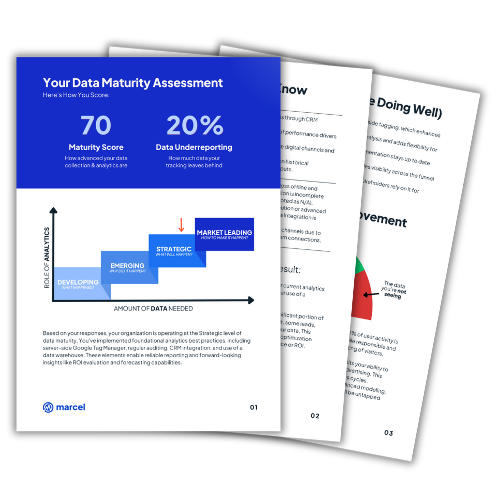Modern marketing teams are drowning in data - but not always swimming in insights.
From web analytics and paid media to CRM systems and email platforms, marketers collect information at nearly every touchpoint. But when that data is scattered across tools, making sense of it becomes a serious challenge. Reports are fragmented, insights are delayed, and opportunities are often missed.
BigQuery, Google Cloud’s serverless data warehouse, is changing that. It empowers marketing teams to consolidate, analyze, and act on their data with speed and precision - no data engineering background required.
In this guide, we’ll break down what BigQuery is, why it matters to marketers, and how your team can use it to become faster, smarter, and more data-driven.

What Is BigQuery?
BigQuery is Google Cloud’s fully-managed, serverless data warehouse that enables users to run super-fast SQL queries on large datasets.
Here’s what that means in plain terms:
Serverless: No need to maintain infrastructure. Google handles all backend management.
Massive scale: Designed to analyze terabytes and petabytes of data across millions - or even billions - of rows.
SQL-based: Uses standard SQL syntax, making it accessible for marketers with basic query skills or analysts familiar with databases.
Flexible pricing: You pay per query or can opt for flat-rate pricing depending on usage.
Behind the scenes, BigQuery leverages columnar storage and parallel processing, which allows it to process huge volumes of data quickly and cost-effectively.
In short, BigQuery lets marketers unlock value from raw data - without waiting on IT or writing complex code.
Why BigQuery Matters to Marketing Teams
Marketers are expected to connect the dots across channels and prove ROI, but siloed systems make this difficult. BigQuery solves this by acting as a centralized hub for marketing data, enabling faster, more flexible analysis across tools.
Here’s why it matters:
Fill Consent Gaps: Connect complete data sources (e.g., CRM) with partial sources (e.g., GA4) and fill gaps left behind by consent preferences, ad blockers and more.
Unified Insights: Connect and analyze data from web analytics, ad platforms, CRMs, and more - all in one place.
Advanced Reporting: Move beyond platform dashboards with fully customizable queries and visualizations.
Faster Decision-Making: With real-time or near-real-time data access, marketers can pivot campaigns based on performance instantly.
Deeper Attribution: Build and test custom attribution models that reflect your unique sales funnel.
Customer Intelligence: Understand full customer journeys, behaviors, and segments across channels.
BigQuery isn't just a data tool - it's the backbone of a truly data-driven marketing strategy.
Ways Marketing Teams Use BigQuery
1. GA4 + BigQuery for Event-Level Analytics
GA4’s native integration with BigQuery allows marketers to export raw, event-level data and analyze it however they want. Unlike the GA4 interface, which has limitations on historical lookback, sampling, and user-level insights, BigQuery provides:
Unrestricted access to historical user behavior
Custom funnel building and user journey mapping
Cohort tracking across devices and sessions
Detailed event sequencing (e.g., scroll, click, form submission patterns)
This is particularly powerful for high-traffic sites or organizations with complex user paths that standard GA4 reports can’t capture effectively.
2. Custom Attribution Modeling
Marketing teams often rely on out-of-the-box attribution models that don’t match their buyer journeys. BigQuery lets you:
Design and compare custom attribution models (first-touch, last-touch, linear, U-shaped, time decay, data-driven, etc.)
Track conversion paths across channels and time
Tie revenue and LTV to original source or campaign touchpoints
With BigQuery, you’re no longer limited to what tools like Google Ads or HubSpot say “caused” a conversion - you can build models that reflect reality.
3. Unifying CRM, Paid Media, and Web Data
One of BigQuery’s biggest strengths is its ability to bring together disparate datasets. Marketing teams can:
Merge GA4 behavioral data with Salesforce or HubSpot lead records
Tie ad campaign spend to lead quality, deal size, and pipeline contribution
Create dashboards that span impressions → clicks → conversions → deals
This full-funnel visibility supports better budget allocation, lead scoring refinement, and sales and marketing alignment.
4. Advanced Segmentation and Cohort Analysis
BigQuery allows you to group users by behaviors, campaign interactions, or lifecycle milestones to uncover patterns like:
Which sources drive the most engaged users over time
How different onboarding paths affect retention
What content paths lead to high-value actions (like demo requests or repeat purchases)
These insights help marketers move from broad targeting to precision messaging, improving campaign performance and customer experiences
Do you trust your data?
Turn uncertainty into insight. Our Data Maturity Assessment gives you a personalized report with your strengths, gaps, and next steps.

Benefits of BigQuery for Marketing Teams
BigQuery offers a range of tangible benefits that address the pain points of most modern marketing departments:
Speed: Even massive datasets are queried in seconds. No more waiting for reports to load or exports to complete.
Scalability: Whether you're analyzing 10,000 rows or 10 billion, BigQuery handles it seamlessly.
Customization: You control what metrics you measure, how you group data, and what defines success.
Integrations: Easily connects with GA4, Google Ads, Looker Studio, Salesforce, and dozens of other tools.
Cost Efficiency: With a pay-per-query model, you only pay for what you use - making it affordable to start and scale.
For marketing teams tired of being limited by black-box reporting, BigQuery offers both power and flexibility.
Common Challenges Marketing Teams Face with BigQuery
BigQuery is powerful, but it comes with a learning curve. Here are a few challenges marketing teams often run into and how to navigate them.
Getting Comfortable with SQL
BigQuery runs on SQL, which may be new for many marketers. While you don’t need to be an expert, understanding the basics goes a long way. Many teams start with templates or get support from analytics partners while they build confidence.
Managing Query Costs
Because BigQuery charges based on data scanned, inefficient queries can get expensive. Using filters, previewing query sizes, and setting budget alerts can help you stay in control.
Keeping Data Organized
Without structure, datasets and queries can get messy fast. Creating naming conventions, documentation, and assigning ownership helps keep everything manageable as your data grows.
Automating Reports
Manually running queries or building reports can be time-consuming. Tools like Looker Studio let you connect BigQuery directly to dashboards so your reports update automatically.
Knowing Where to Start
BigQuery can do a lot - but that can be overwhelming. Focus on clear marketing goals, like building custom attribution models or connecting CRM and web data, to guide your setup.
How Marcel Digital Helps Marketing Teams Use BigQuery
At Marcel Digital, we work closely with marketing teams to turn BigQuery into a powerful, accessible part of their data stack.
Here’s how we support our clients:
BigQuery Setup & Strategy: We help implement the right architecture, whether you’re starting with GA4 exports or unifying multi-platform data.
Custom Reporting: We build SQL queries, dashboards, and Looker Studio reports tailored to your business goals.
Attribution & Funnel Analysis: Our team helps you create models that go beyond vanity metrics and actually show impact across the funnel.
Training & Enablement: We train marketing teams on how to query their data, use dashboards effectively, and spot trends early.
Ongoing Optimization: From performance tuning to new data integrations, we ensure your BigQuery environment evolves with your needs.
Whether you’re just getting started or looking to elevate your reporting capabilities, Marcel Digital helps you get the most from your data - without the complexity.

Unlock the Power of BigQuery with Marcel Digital
BigQuery transforms marketing data from a scattered collection of spreadsheets and dashboards into a centralized engine for insight and action. It enables teams to answer complex questions, make smarter decisions, and clearly prove the impact of their efforts.
But to truly unlock its potential, you need the right strategy, structure, and support.
Partner with Marcel Digital to implement and scale BigQuery in a way that serves your unique marketing goals. From setup and training to analysis and visualization, we’ll help you turn raw data into real results.
Contact Marcel Digital today and let’s get started.
